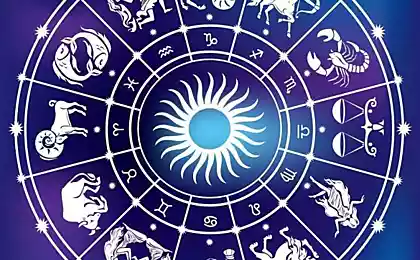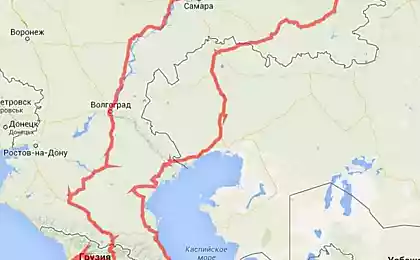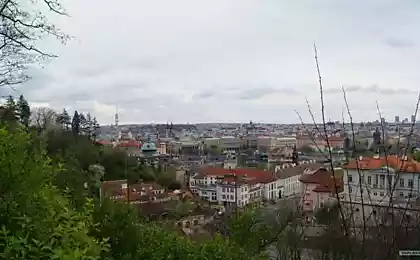474
The mystery of the city of Roseto
The book by canadian journalist Malcolm Gladwell's "Geniuses and outsiders: Why one everything and the other nothing?". The book essentially is a collection of skillfully told stories, United by one theme — explaining the successes and failures of people, we tend to overestimate the role of personal contribution and underestimate factors such as luck, favorable circumstances, environment and culture.
We want to quote opens the book the history of the Italian town of Roseto, whose inhabitants were famous for their excellent health and longevity. What is their secret? In the food? Wine? Climate? Read and find out.
Ninety six million five hundred ninety eight thousand three hundred eighty one
"Roseto Vaporstore is one hundred sixty kilometers South-East of Rome, at the foot of the Apennines in the Italian province of Foggia. It is built on the principle medieval villages: around the large Central square. On the square stands the Palace of Sagese family that once owned vast lands in these parts. Arched passage leads to the Church of the Madonna of mount Carmel. Narrow stone stairs, both sides of which were crowded two-storey houses with red tile roofs climb the mountain.
For centuries, the inhabitants of Roseto worked in the marble quarries in the mountains or on the fields in the sprawling valley. Every morning and every evening, they run for six kilometres down the mountain and back up the hill. They had a hard time. These peasants were almost illiterate, desperately poor, and not particularly hoping for the best. But in the late nineteenth century until they heard a rumor about the country on the other side of the ocean and the opportunities that it offered.
In January 1882 a group of 11 residents of Roseto ten men and one boy — went overseas, to new York. The first night they spent on the floor of a tavern on mulberry street in Manhattan called Little Italy. After that, they moved West and found work in a slate quarry in 145 miles from new York city, in the town of Bangor, Pennsylvania. A year of Italian Roseto in America and left another 15 people.
Some of them settled in Bangor to work together with their compatriots in the slate quarry. Newly arrived immigrants sent a message home, describing the prospects of the New world, and soon rosetone one after another began to pack up and move to Pennsylvania. The first trickle of immigrants turned into a powerful stream. In just one 1894 1200 rosetone applied for an American passport, leaving entire streets of their village deserted.
Twenty five million three hundred eighty seven thousand twenty nine
The newcomers began to buy land on a rocky hillside, connected with Bangaram one steep trail. In the narrow streets, scattering up and down the slope, more closely placed to each other a two-story stone houses with slate roofs. Appeared the Church of the virgin Mary of mount Carmel. The main street on which it stood, called Garibaldi Avenue in honor of the hero of Italy's unification. At first, your town residents dubbed the New Italy. But soon the name was changed, selecting what seemed to them most appropriate, given that they all came from the same village. New Italy turned in Roseto.
In 1896 the rector of the Church of the virgin Mary of mount Carmel was an energetic young priest father Pasquale de Nisko. He created a Church community, began to organize the festival. Urged residents to clear the land and planted in the back yards of their homes garlic, beans, potatoes, melons and fruit trees. He distributed seeds and tubers. The town awoke to life. Rosetone began to breed pigs and grow grapes, used to make homemade wine. Schools were built, a monastery, a Park and a cemetery created. On Garibaldi Avenue opened small shops, bakeries, restaurants and bars. There were about a dozen garment factories.
Neighboring Bangor was populated by mostly Welsh and English, and in another nearby town lived mostly Germans. Due to strained relations between migrants of British, German and Italian descent Roseto left the city, closed to the outside world. If you had the opportunity to wander around the streets of Roseto in the first few decades of the twentieth century, you would have heard only Italian speech, and not just Italian, and the southern dialect of Foggia, which at the time said in the Italian Roseto.
For residents of Roseto in their town was the whole world, tiny but self-sufficient. So he would have remained if not for a man named Stewart wolf.
Wolf was a physician. Studied diseases of the stomach and taught in the medical school of the University of Oklahoma. The summers were spent on a farm in Pennsylvania not far from Roseto-although that didn't mean anything, since Roseto was so distant from the rest of the world that it is little known even residents of neighboring towns. "One summer somewhere in the late 1950s — I was invited to give a lecture at the local medical society, said Wolfe in an interview. — After the lecture I was approached by a local doctor and invited for a glass of beer. During the conversation he told me: "You know, I've been here seventeen years, patients come to me from everywhere, but in all that time I have not had a single patient from Roseto younger than sixty-five with heart disease"".
Wolfe reacted to this message with skepticism. In the 1950s, has not yet appeared medications for lowering cholesterol levels and was not introduced prevention of heart disease. Heart attacks have purchased in the United States reached epidemic proportions and become the leading cause of death for people younger than 65 years. Common sense dictates that as a physician, it is impossible never to deal with heart disease.
Wolf decided to investigate. Enlisting the help of students and colleagues, he has examined the death certificates of residents of the city over a long period — as much as could get. Analyzed the records of doctors. Made up pedigrees. "Work was rife, recalled Wolff. The study was initiated in 1961 the Mayor gave us to help his four sisters and allowed to settle in the town hall. I asked where they meet, to which he replied: "We hold". Ladies would bring us lunch. We had little booths where we took people's blood and do electrocardiograms. So it's been four weeks. After that, I talked with the authorities, and they are all summer gave us the school building. There we were invited all the inhabitants of Roseto examined.“
The results looked more than strange. Not a single resident of Roseto under the age of 55 years died from a heart attack and had no heart disease. Among people older than 65 years, the mortality rate from heart disease was half of the average in the country. Mortality from all other causes was 30-35% lower than, in theory, would have to be.
Wolf called on the help of his friend, sociologist from Oklahoma John Bruna. "I hired medical students and graduate students of sociology as interviewers, and we went from house to house, asking of all people over twenty-one years, says Brun. These events occurred over fifty years ago, but in the voice of Bruno, when he talks about this study, and are now heard with wonder. — No suicides, no alcoholism, no drug addiction and very little crime. They didn't have a single person on the Dole. Then we began to look for someone with a stomach ulcer. No case. Local residents have died of old age. So here“.
The fellow wolf had a special name for people like rosamonte, for those to whom it was impossible to apply the standard rules for those, whose life went beyond the usual. The inhabitants of Roseto were special.
First, Wolff suggested that rosetone follow a special diet, brought from the Old world and allows them to maintain such an enviable health. But this version was abandoned. The inhabitants of Roseto were fried in lard, not healthy olive oil, as is customary in Italy. Italian pizza was a thin crispy bread with salt, oil, tomatoes, anchovies and onions.
In Pennsylvania, the same thick pizza sagged under the weight of sausages, pepperoni, salami, ham and eggs. Before sweets such as cookies and savory bagels, relied only on Christmas, but in Venice they enjoyed all year round. Nutritionists conducted the analysis of the diet of rosetone showed that 41% of the calories they consume accounts for the fat. Besides, these people were not one of those who gets up at dawn, does yoga or runs, six kilometers. Many were puffing like a locomotive, or obese.
Ninety three million seven hundred fifty seven thousand five hundred sixty three
But if the cause is not in the diet and not in the sport, then maybe in the genes? Rosetone who came from the same town, were bound by blood and Wolfe assumed the existence of certain protective genes, saves them from diseases. He examined the medical records of all relatives of rosetone living in other parts of the United States to see whether they are so excellent health. Nothing of the sort.
Then wolf began to explore the area in which they lived, the objects of his study. It can be so beneficial to their health was affected by living in the foothills of Eastern Pennsylvania? Next to Roseto, just below the hill, was located in Bangor and is just a few miles away in Nazareth. These two towns were the same size as Roseto, and lived in a very religious hardworking European immigrants. Wolf shoveled a medical card in both towns. Among residents over 65 years the death rate from heart disease was three times higher than rosetone.
Woolf gradually came to the conclusion that the secret of Roseto lies not in the diet and not the sport, not in the genes and not in the area. The answer to the mystery lay in the city. Wandering through it and communicating with its inhabitants, the wolf and Broun began to notice the imprint that history has left on Roseto. They watched as rosetone visit, chatting in Italian on the streets and cook treats for each other.
Met with great clans, the components of the social structure of the city. Seen live under the same roof, three generations, and the respect enjoyed by the elderly.
Went to a mass and feel like the Church soothes and unites the audience. Counted 22 public organizations town with a population of 2,000 people. Imbued with the prevailing spirit of equality here: the rich do not flaunt their wealth and helped the less fortunate to cope with adversity.
Moving from southern Italy to the mountains of Eastern Pennsylvania the culture of fraternities, rosetone have created a stable and reliable social structure, protecting them from the evils of the modern world. They kept their health because of where they were born, thanks to the world who have created for themselves in the tiny mountain town. "You come to Roseto for the first time and see the dining table going three generations, see the bakeries, the people walking the streets or sitting on the porch and chatting with each other, I see factories making shirts, where women work during the day while their men work in the slate quarries, says Brun. Same thing you'd see in the countryside in Italy. An amazing sight“.
Can you imagine how distrust had to face Bruno and wolf, when they presented the results of their research to the medical community. They participated in the conferences in which their colleagues have presented a multi-page data, furnished in a complex table, Recalling that on such and such a gene, in this physiological process. As Broun and Woolf talked about a mysterious and magical power of people stopping to chat in the street and three generations living under one roof. Traditional theories convince us: longevity depends on who we are — from our genes, from our decisions. From what we eat, how much exercise regularly, the quality of medical service use. We are not used to consider health in the context of culture.
Bruno and wolf had to convince the medical community of the need to look at health and heart disease under a new perspective, to realize that find out the causes of longevity is not possible if to be guided only by individual decisions and actions. We cannot limit ourselves to studying a single person. You need to understand what culture he belongs to, who his friends and family some of the places he came from. You need to accept the idea that the values of the world in which we live, and the people who surround us have a profound impact on our personality."published
P. S. And remember, only by changing their consumption — together we change the world! ©
Join us in Facebook , Vkontakte, Odnoklassniki
Source: makeright.ru/blog/zagadka-goroda-rozeto/
We want to quote opens the book the history of the Italian town of Roseto, whose inhabitants were famous for their excellent health and longevity. What is their secret? In the food? Wine? Climate? Read and find out.
Ninety six million five hundred ninety eight thousand three hundred eighty one
"Roseto Vaporstore is one hundred sixty kilometers South-East of Rome, at the foot of the Apennines in the Italian province of Foggia. It is built on the principle medieval villages: around the large Central square. On the square stands the Palace of Sagese family that once owned vast lands in these parts. Arched passage leads to the Church of the Madonna of mount Carmel. Narrow stone stairs, both sides of which were crowded two-storey houses with red tile roofs climb the mountain.
For centuries, the inhabitants of Roseto worked in the marble quarries in the mountains or on the fields in the sprawling valley. Every morning and every evening, they run for six kilometres down the mountain and back up the hill. They had a hard time. These peasants were almost illiterate, desperately poor, and not particularly hoping for the best. But in the late nineteenth century until they heard a rumor about the country on the other side of the ocean and the opportunities that it offered.
In January 1882 a group of 11 residents of Roseto ten men and one boy — went overseas, to new York. The first night they spent on the floor of a tavern on mulberry street in Manhattan called Little Italy. After that, they moved West and found work in a slate quarry in 145 miles from new York city, in the town of Bangor, Pennsylvania. A year of Italian Roseto in America and left another 15 people.
Some of them settled in Bangor to work together with their compatriots in the slate quarry. Newly arrived immigrants sent a message home, describing the prospects of the New world, and soon rosetone one after another began to pack up and move to Pennsylvania. The first trickle of immigrants turned into a powerful stream. In just one 1894 1200 rosetone applied for an American passport, leaving entire streets of their village deserted.
Twenty five million three hundred eighty seven thousand twenty nine
The newcomers began to buy land on a rocky hillside, connected with Bangaram one steep trail. In the narrow streets, scattering up and down the slope, more closely placed to each other a two-story stone houses with slate roofs. Appeared the Church of the virgin Mary of mount Carmel. The main street on which it stood, called Garibaldi Avenue in honor of the hero of Italy's unification. At first, your town residents dubbed the New Italy. But soon the name was changed, selecting what seemed to them most appropriate, given that they all came from the same village. New Italy turned in Roseto.
In 1896 the rector of the Church of the virgin Mary of mount Carmel was an energetic young priest father Pasquale de Nisko. He created a Church community, began to organize the festival. Urged residents to clear the land and planted in the back yards of their homes garlic, beans, potatoes, melons and fruit trees. He distributed seeds and tubers. The town awoke to life. Rosetone began to breed pigs and grow grapes, used to make homemade wine. Schools were built, a monastery, a Park and a cemetery created. On Garibaldi Avenue opened small shops, bakeries, restaurants and bars. There were about a dozen garment factories.
Neighboring Bangor was populated by mostly Welsh and English, and in another nearby town lived mostly Germans. Due to strained relations between migrants of British, German and Italian descent Roseto left the city, closed to the outside world. If you had the opportunity to wander around the streets of Roseto in the first few decades of the twentieth century, you would have heard only Italian speech, and not just Italian, and the southern dialect of Foggia, which at the time said in the Italian Roseto.
For residents of Roseto in their town was the whole world, tiny but self-sufficient. So he would have remained if not for a man named Stewart wolf.
Wolf was a physician. Studied diseases of the stomach and taught in the medical school of the University of Oklahoma. The summers were spent on a farm in Pennsylvania not far from Roseto-although that didn't mean anything, since Roseto was so distant from the rest of the world that it is little known even residents of neighboring towns. "One summer somewhere in the late 1950s — I was invited to give a lecture at the local medical society, said Wolfe in an interview. — After the lecture I was approached by a local doctor and invited for a glass of beer. During the conversation he told me: "You know, I've been here seventeen years, patients come to me from everywhere, but in all that time I have not had a single patient from Roseto younger than sixty-five with heart disease"".
Wolfe reacted to this message with skepticism. In the 1950s, has not yet appeared medications for lowering cholesterol levels and was not introduced prevention of heart disease. Heart attacks have purchased in the United States reached epidemic proportions and become the leading cause of death for people younger than 65 years. Common sense dictates that as a physician, it is impossible never to deal with heart disease.
Wolf decided to investigate. Enlisting the help of students and colleagues, he has examined the death certificates of residents of the city over a long period — as much as could get. Analyzed the records of doctors. Made up pedigrees. "Work was rife, recalled Wolff. The study was initiated in 1961 the Mayor gave us to help his four sisters and allowed to settle in the town hall. I asked where they meet, to which he replied: "We hold". Ladies would bring us lunch. We had little booths where we took people's blood and do electrocardiograms. So it's been four weeks. After that, I talked with the authorities, and they are all summer gave us the school building. There we were invited all the inhabitants of Roseto examined.“
The results looked more than strange. Not a single resident of Roseto under the age of 55 years died from a heart attack and had no heart disease. Among people older than 65 years, the mortality rate from heart disease was half of the average in the country. Mortality from all other causes was 30-35% lower than, in theory, would have to be.
Wolf called on the help of his friend, sociologist from Oklahoma John Bruna. "I hired medical students and graduate students of sociology as interviewers, and we went from house to house, asking of all people over twenty-one years, says Brun. These events occurred over fifty years ago, but in the voice of Bruno, when he talks about this study, and are now heard with wonder. — No suicides, no alcoholism, no drug addiction and very little crime. They didn't have a single person on the Dole. Then we began to look for someone with a stomach ulcer. No case. Local residents have died of old age. So here“.
The fellow wolf had a special name for people like rosamonte, for those to whom it was impossible to apply the standard rules for those, whose life went beyond the usual. The inhabitants of Roseto were special.
First, Wolff suggested that rosetone follow a special diet, brought from the Old world and allows them to maintain such an enviable health. But this version was abandoned. The inhabitants of Roseto were fried in lard, not healthy olive oil, as is customary in Italy. Italian pizza was a thin crispy bread with salt, oil, tomatoes, anchovies and onions.
In Pennsylvania, the same thick pizza sagged under the weight of sausages, pepperoni, salami, ham and eggs. Before sweets such as cookies and savory bagels, relied only on Christmas, but in Venice they enjoyed all year round. Nutritionists conducted the analysis of the diet of rosetone showed that 41% of the calories they consume accounts for the fat. Besides, these people were not one of those who gets up at dawn, does yoga or runs, six kilometers. Many were puffing like a locomotive, or obese.
Ninety three million seven hundred fifty seven thousand five hundred sixty three
But if the cause is not in the diet and not in the sport, then maybe in the genes? Rosetone who came from the same town, were bound by blood and Wolfe assumed the existence of certain protective genes, saves them from diseases. He examined the medical records of all relatives of rosetone living in other parts of the United States to see whether they are so excellent health. Nothing of the sort.
Then wolf began to explore the area in which they lived, the objects of his study. It can be so beneficial to their health was affected by living in the foothills of Eastern Pennsylvania? Next to Roseto, just below the hill, was located in Bangor and is just a few miles away in Nazareth. These two towns were the same size as Roseto, and lived in a very religious hardworking European immigrants. Wolf shoveled a medical card in both towns. Among residents over 65 years the death rate from heart disease was three times higher than rosetone.
Woolf gradually came to the conclusion that the secret of Roseto lies not in the diet and not the sport, not in the genes and not in the area. The answer to the mystery lay in the city. Wandering through it and communicating with its inhabitants, the wolf and Broun began to notice the imprint that history has left on Roseto. They watched as rosetone visit, chatting in Italian on the streets and cook treats for each other.
Met with great clans, the components of the social structure of the city. Seen live under the same roof, three generations, and the respect enjoyed by the elderly.
Went to a mass and feel like the Church soothes and unites the audience. Counted 22 public organizations town with a population of 2,000 people. Imbued with the prevailing spirit of equality here: the rich do not flaunt their wealth and helped the less fortunate to cope with adversity.
Moving from southern Italy to the mountains of Eastern Pennsylvania the culture of fraternities, rosetone have created a stable and reliable social structure, protecting them from the evils of the modern world. They kept their health because of where they were born, thanks to the world who have created for themselves in the tiny mountain town. "You come to Roseto for the first time and see the dining table going three generations, see the bakeries, the people walking the streets or sitting on the porch and chatting with each other, I see factories making shirts, where women work during the day while their men work in the slate quarries, says Brun. Same thing you'd see in the countryside in Italy. An amazing sight“.
Can you imagine how distrust had to face Bruno and wolf, when they presented the results of their research to the medical community. They participated in the conferences in which their colleagues have presented a multi-page data, furnished in a complex table, Recalling that on such and such a gene, in this physiological process. As Broun and Woolf talked about a mysterious and magical power of people stopping to chat in the street and three generations living under one roof. Traditional theories convince us: longevity depends on who we are — from our genes, from our decisions. From what we eat, how much exercise regularly, the quality of medical service use. We are not used to consider health in the context of culture.
Bruno and wolf had to convince the medical community of the need to look at health and heart disease under a new perspective, to realize that find out the causes of longevity is not possible if to be guided only by individual decisions and actions. We cannot limit ourselves to studying a single person. You need to understand what culture he belongs to, who his friends and family some of the places he came from. You need to accept the idea that the values of the world in which we live, and the people who surround us have a profound impact on our personality."published
P. S. And remember, only by changing their consumption — together we change the world! ©
Join us in Facebook , Vkontakte, Odnoklassniki
Source: makeright.ru/blog/zagadka-goroda-rozeto/






















